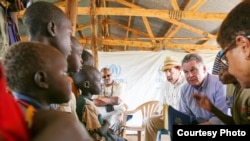A U.S. congressional delegation returned from central Africa last week with one overriding question: what can be done to stop South Sudan's war and help the refugees streaming into Uganda, suffering from a lack of food?
Representative Chris Smith, a Republican from New Jersey, says the answer lies with the parties in South Sudan's conflict, especially the government and military, which have been accused of blocking food aid to needy populations, using rape as a weapon of war and engaging in ethnic cleansing.
“The root causes need to be attacked far more aggressively and that was our message, that was my message strongly to [South Sudan President] Salva Kiir,” Smith told VOA. “This can end where there's a political will, where there's a will within the military to be a professional fighting force, not a rogue fighting force made up of people that fleece, rape and murder at will.”
Smith, along with Representative Karen Bass, a California Democrat, just returned from a seven-day trip to South Sudan and Uganda to see refugee camps, meet with the presidents of both countries and talk with military and religious leaders.
The delegation visited Uganda’s Bidi-Bidi refugee camp, which hosts some 300,000 people and is now the largest such camp in the world.
A lack of funding has forced aid agencies to cut food allowances there from 2,100 calories per day to about half that amount, Smith said.
“The poorest of the poor suffer greatly because of that lack of resourcing,” Smith told VOA. “So, I think we need to do even more in terms of food security, medicines, shelter -- but especially the food side.”
More help needed
The situation could easily worsen, as Uganda is struggling to meet the needs of the refugees streaming across its border at a rate as high as 2,800 per day. The country now hosts an estimated 900,000 South Sudanese refugees who have fled their war-torn country in one of the largest exoduses in recent history.
“It is an arduous move for them once they get there to find relative safety, and we were at the receiving camps before they were taken to the larger camp by bus,” Smith said. “They get stabilized, get some food, some medicines, an assessment medically to ensure infectious diseases are discovered…So there's a very methodical effort but there's no doubt and even the head of refugees for Uganda has stated publicly that they are reaching a capacity.”
The United States continues to lead the world in funding and allocated $911 million for South Sudan in 2016-2017. Smith was heartened to see a warehouse in the camp of Bentiu in South Sudan piled high with enough food aid from the U.S. to feed 400,000 people.
Less heartening was the sight of World Food Program flights taking off to drop food from the skies, because aid workers are unable to reach remote, war-ravaged areas.
More help is needed, Smith said. “The U.S. is stepping up to the plate but...given the needs, more needs to be done,” he said.
No solution will be possible until the warring parties prioritize peace. The delegation met with South Sudan’s president, Salva Kiir, for about two hours and his newly appointed head of the armed forces, General James Ajongo Mawut.
Change will take political will above all else and Smith said he has some confidence that the change of leadership in the armed forces will lead to reform.
"This entire famine is not nature-made," Smith said. "There's always going to be shortages of rainfall which can be alleviated by short-term gaps, but this has been driven by war."

